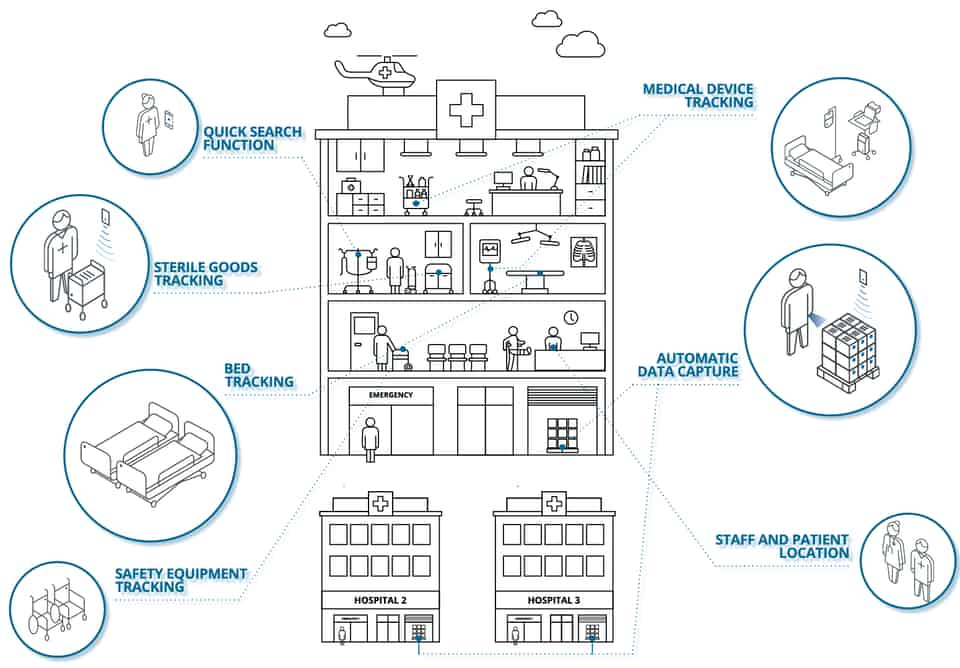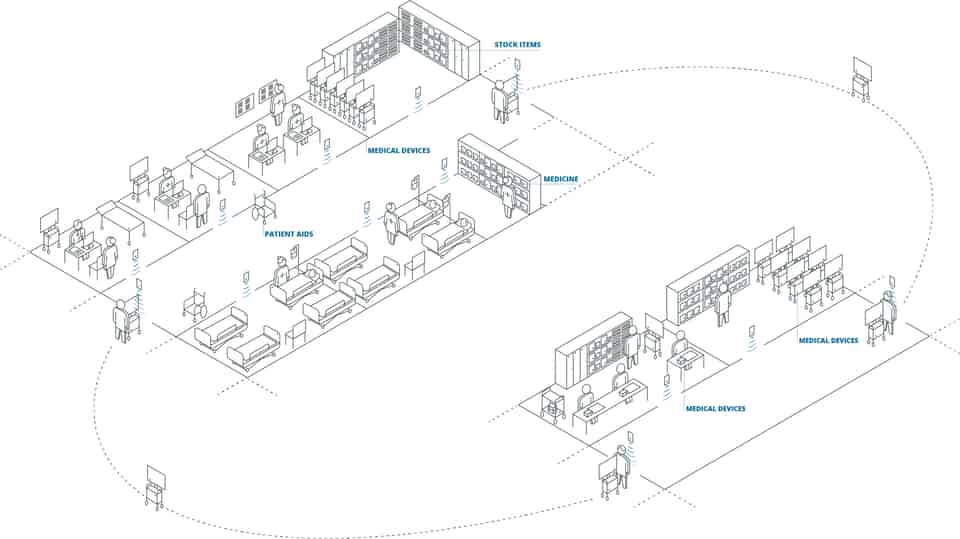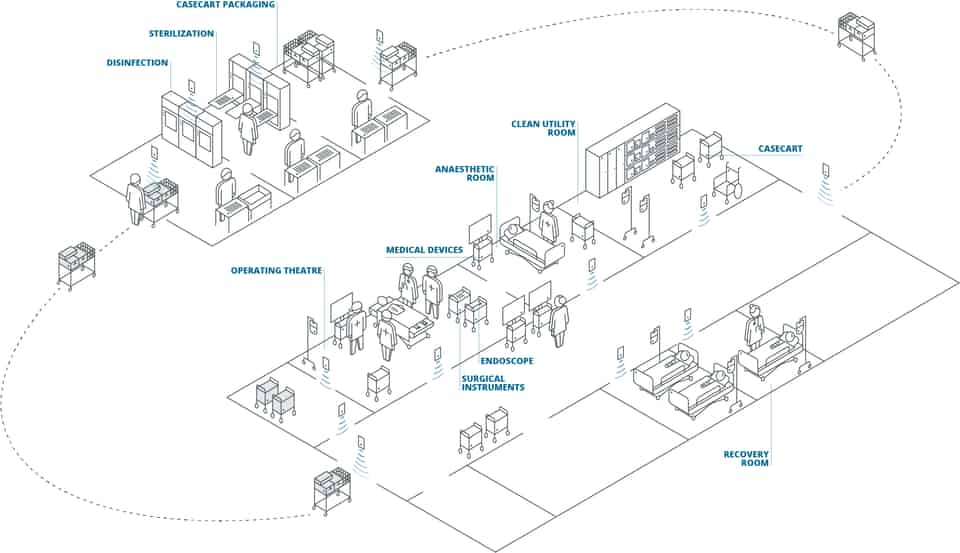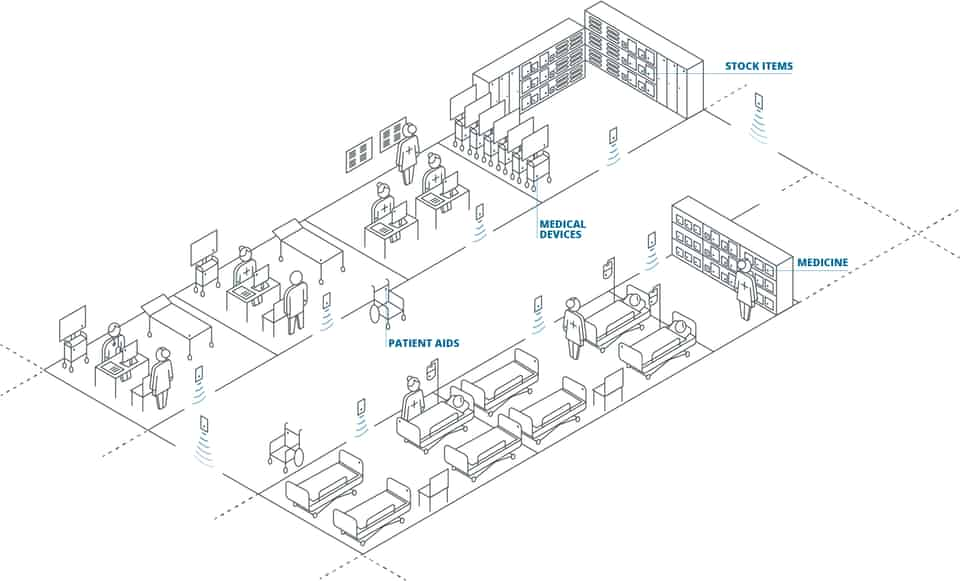RFID use in healthcare:
In the ever-evolving landscape of healthcare, technology continues to play a pivotal role in reshaping patient care. Among the innovative solutions available, radio-frequency identification (RFID) tracking technology stands out as a transformative force, contributing significantly to the improvement of patient outcomes. In this article, we explore how RFID is revolutionizing healthcare delivery and positively impacting the patient experience.
What is RFID tracking?
RFID tracking is a technology that utilizes radio waves to wirelessly identify and track objects which are equipped with RFID tags. These tags contain unique identification information and can either be passive (drawing power from the RFID reader's signal) or active (having their own power source). RFID tracking is widely used in various industries for the real-time monitoring and management of assets, inventory and personnel. It provides accurate and efficient data capture, contributing to streamlined processes, enhanced security, and improved visibility across a range of applications, from supply chain management to postal deliveries and beyond.
How does RFID technology support the healthcare industry?
In the healthcare industry, RFID technology is instrumental in improving operational efficiency, which in turn contributes to better patient care and safety. RFID-enabled solutions are being used to track medical equipment including beds, monitor medication administration, enhance surgical instrument accountability and streamline patient flow. Our X-Tracking™ solution uses RFID technology to support healthcare providers with error reduction, timely patient care and providing an overall enhanced healthcare experience. Let’s take a closer look at some of the RFID benefits in healthcare:
How does RFID technology support the healthcare industry?
1. Ensuring accurate medication administration
RFID tags applied to medication containers and trays enable precise tracking throughout the administration process. This ensures that patients receive the right medications, in the right dosage and at the right time. According to the World Health Organisation (WHO) around 1 in every 10 patients is harmed in healthcare and more than half of this is preventable, with a large proportion being attributed to medication errors. Using RFID technology helps prevent these errors – a critical factor in enhancing patient safety.
2. Streamlining medical equipment management
In a busy healthcare environment, accurate tracking of medical equipment is paramount. RFID tags on equipment allow healthcare providers to locate necessary devices swiftly, in turn reducing delays in patient care. This streamlined process not only enhances workflow efficiency, but also contributes to faster response times in critical situations, positively impacting patient outcomes.
How does RFID technology support the healthcare industry?
3. Sterile goods tracking
RFID technology is increasingly being employed in the tracking of surgical instruments. By attaching RFID tags to sterile trays and case carts, healthcare facilities can monitor the usage, sterilization status and location of each tray set. This level of traceability ensures accurate visibility of instrument trays throughout the sterilisation and supply chain process, minimizing delays in theatre and avoiding cancelled procedures.
4. Improving patient flow and experience
RFID-enabled patient tracking systems enhance the overall patient experience by improving the flow of care. From appointment scheduling to waiting room management, RFID technology helps to optimize the patient journey. This results in reduced wait times, timely access to healthcare professionals and treatment, and a more seamless and positive experience for patients.
How does RFID technology support the healthcare industry?
5. Reducing asset losses
Healthcare facilities often grapple with the challenge of asset management, including the loss or theft of valuable equipment. According to Hospital and Healthcare Management Magazine, it’s estimated that between 10% and 20% of a typical hospital’s mobile assets are lost or stolen during their useful life, negatively impacting patient treatment, as well as resulting in huge financial losses. RFID tracking systems provide real-time visibility into the location of medical assets, reducing the likelihood of misplacement. This ensures that essential medical devices are readily available when needed, contributing to better patient care.
6. Enabling efficient inventory management
Maintaining optimal stock levels of medical supplies and pharmaceuticals is crucial for uninterrupted patient care. RFID technology aids efficient inventory management by providing real-time insights into stock levels, expiration dates and usage patterns. This enables healthcare providers to make informed decisions, reducing the risk of shortages or wastage and avoid unnecessary procurement of replacement equipment.
Transforming patient care with RFID technology
By improving accuracy, efficiency and transparency across various facets of healthcare delivery, RFID tracking technology contributes to creating a healthcare ecosystem where patient safety and wellbeing take centre stage. The integration of RFID tracking solutions not only streamlines operational processes, but also instils confidence in both healthcare providers and patients, marking a significant leap forward in the pursuit of better healthcare outcomes for all.

Optimize your hospital logistics with X-Tracking
Learn more about our healthcare solution Lyngsoe X-Tracking
Learn how X-Tracking is used
Bed Tracking
Bed tracking and bed management are both crucial in hospitals. Bed management involves allocating and providing beds efficiently, while bed tracking provides real-time visibility of bed locations and statuses. Both are essential for optimizing patient flow and maximizing bed utilization.
Sterile Goods Tracking
Efficient sterile goods management is critical in hospitals to ensure timely patient care. Accurate tracking of sterilized instruments and equipment minimizes delays and optimizes efficiency, reducing operational challenges and staff burden.
Medical Devices Tracking
Tracking mobile medical devices is crucial in busy hospital environments. Categorizing devices based on risk helps prioritize their management. Low-risk devices (Class I) include non-electric wheelchairs, bandages, and some handheld surgical instruments, requiring minimal maintenance.
Safety Equipment Tracking
Safety equipment in hospitals, including patient moving and handling tools and respiratory protective equipment (RPE), plays a critical role in protecting both patients and staff. Efficient tracking of these items ensures safe mobility and minimizes the risk of infections.



